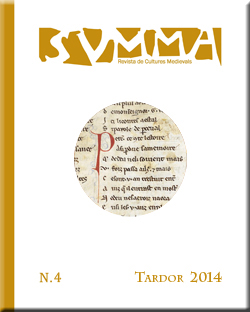Oliver: The Rise and Decline of a Hero
DOI:
https://doi.org/10.1344/Svmma2014.4.3Resum
The essential topic of this paper is the literary figure of Oliver, from his first appearances to his gradual disappearance from the texts. Thus, the starting point is the presence of the anthroponym and the discussions about its etymology, given that numerous problems (as well as some explanations) affecting Western epic poetry and the relationships established between characters and texts can be related to that origin. It seems that he is a southern hero and as such, figured prominently in several lost chansons de geste, from which late or geographically distant versions survive (such as the Scandinavian versions). Since this hero belongs to the Occitan tradition, linked to the basin of the Rhone, and is alien to French epic tradition, the importance of his role in the Chanson de Roland is surprising, and from there, its preeminence in onomastics and in the lists of the Twelve Peers; however, the place he occupies is not always the same, and he is often set aside. In the Iberian Peninsula, it is not unusual to see how other heroes take the place of Oliver: Bernardo del Carpio and Reinaldos de Montalbán. Our paladin ends up being a mere shadow, a distant memory that is finally forgotten.Descàrregues
Publicades
Número
Secció
Llicència
Drets d'autor (c) 2015 Carlos Alvar

Aquesta obra està sota una llicència internacional Creative Commons Reconeixement-NoComercial-SenseObraDerivada 4.0.
Els autors que publiquen en aquesta revista estan d'acord amb els termes següents:
a. Els autors conserven els drets d'autoria i atorguen a la revista el dret de primera publicació de l'obra. SVMMA Revista de Cultures Medievals publica amb una llicència de Reconeixement-NoComercial-CompartirIgual 3.0 Espanya de Creative Commons, la qual permet compartir l'obra amb tercers, sempre que aquests en reconeguin l'autoria, sense ànim de lucre i compartin l'obra derivada en les mateixes condicions.
b. Els autors són lliures de fer acords contractuals addicionals independents per a la distribució no exclusiva de la versió de l'obra publicada a la revista (com ara la publicació en un repositori institucional o en un llibre), sempre que se'n reconegui la publicació inicial en aquesta revista.
c. S'encoratja els autors a publicar la seva obra en línia (en repositoris institucionals o a la seva pàgina web, per exemple), amb l'objectiu d'aconseguir intercanvis productius i fer que l'obra obtingui més citacions (vegeu The Effect of Open Access, en anglès).





